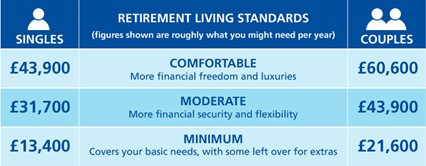News
Pensions are constantly evolving and there may be changes that affect your membership. Therefore, it’s important to keep up to date with what’s happening. Here, we seek to provide you with news which is particularly relevant to you.
The new cost of retirement
Developed by Loughborough University and the Pensions Lifetime Savings Association (PLSA), the RLS are a practical tool to help people understand what life in retirement can look like at 3 different levels: minimum, moderate and comfortable.
They take into account if you live alone or with another person, and consider things like:
- the current cost-of-living
- lifestyle choices, such as holidays, clothing and transport
- food and drink, and
- household costs, such as council tax, energy and water
The 2025 RLS updates
Compared to the huge increases they’ve seen in the previous 2 years, 2025 has seen smaller increases to the amounts required for moderate (+£800 per year) and comfortable (+£400 per year) standards of living, and a reduction (-£1000) to the amount required for the minimum living standard, for a single person in retirement. If you live in London, the costs are higher and can be found here.

The standards reflect changes in public behaviours, and the cost-of-living
The changes are due to a fall in the energy price cap until October 2024, and modest food price rises.
Groups living to the minimum standard made cutbacks to some expenditure items, such as technology, hairdressing services, clothing, charity donations and taxi transport, and increased their budget for rail fares (from £100-£180 per year).
Amounts required to cover the weekly costs of domestic fuel have fallen across all standards by more than a quarter, for all household types. For couples living at the minimum standard, the weekly domestic fuel budget has fallen by £12.44. The moderate and the comfortable weekly budgets have fallen by £16.74. For singles living at the minimum standard, the weekly domestic fuel budget has fallen by £8.82 and the moderate and comfortable have fallen by £15.38.
The standards assume you won’t have a mortgage or rent in retirement. If this won’t be the case, you’ll need to add housing costs to your budget.
The RLS can help you plan for life after work
Based on research-backed information, they provide real-life examples for people to aim towards, empowering savers to take action by showing the level of expenditure required for different standards of living. And although all circumstances are different, and they won’t exactly reflect yours, they’re there to be used as a guide.
Using the RLS and your member website, you can take steps to secure the future you deserve
- You can think carefully about what you can afford and create a realistic savings goal
Research shows that by having a clear savings goal, it brings you clarity, inspires action, and you are more likely to achieve it. Check out this page on your member website to help you find out how much you might need for the retirement you hope for and if you have enough in your pension savings.
- You can check if you’re on track towards your goal
You can contact Railpen, your Scheme administrator, to request an estimate of your current savings. Watch out for your Annual Benefit Statement arriving in the post soon as it offers important information about the value of your pension and helps you keep track of how your pension savings are building up.
- You can take your pension at a later age
Delaying your retirement, and working for longer, could help to build up more pension benefits.
- You can think about other sources of income, like the State Pension
The State Pension age is due to increase to 67 between 2026-2028. If you’re considering taking your pension later, the addition of your State Pension could contribute towards your income, and lifestyle, in retirement. You can read more about the State Pension by visiting gov.uk/browse/working/state-pension.
- You may find a lost pension pot or have another pension
With Pensions Dashboards launching soon, the government-backed scheme to help people trace old pension pots, you may find you have a lost pension pot. Keep an eye on the Pensions Dashboards website for any updates.
- You can get some financial advice if you need it
If you’re thinking about making changes to your pension, or taking your pension, you can speak to a financial adviser. You can find a list of Independent Financial Advisers (IFAs) by visiting unbiased.co.uk.
